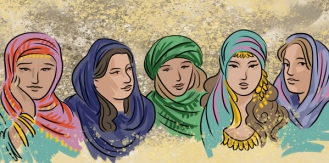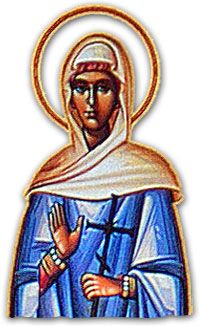So that works as a transition to women in an elder role:
The church I am in right now doesn’t have anyone with the title “elder” – but we have a leadership board and we ask the church to select them based on the traits listed in I Timothy 3.
This is the decision making body of lay (not staff) leaders. They are elected by the church membership each year. The only quality of the elder that we do not emphasize for them is the teaching aspect. We ask that each of them be able to share the gospel through their own testimony and to have the ability to handle the word of truth well, but they do not have to be in a teaching role. (this is actually why the Baptist church historically reserved the title “elder” for teaching pastors, as I understand it)…
We do encourage women to accept the roles as well. Some years, no women are voted into the roles, but most years, at least one is.
So, engaging with the room created by the material above, (including the wording of “husband of one wife” notes) we certainly see women in roles of leadership throughout scripture.

Miriam, Deborah, Huldah, Esther, Naomi, Anna, Hannah, Abigail, and others are described as taking positions of leadership and perhaps most significantly, as prophets (Acts 2:17-18/Joel 2:28-32)
17 “ ‘And in the last days it shall be, God declares, that I will pour out my Spirit on all flesh, and your sons and your daughters shall prophesy, and your young men shall see visions, and your old men shall dream dreams; 18even on my male servants and female servants in those days I will pour out my Spirit, and they shall prophesy.”
There is even good reason to think that Paul gives the title “apostle” (which just means “sent” in the original language) to a woman named Junia. Of course, as always, there are multiple reasonable and justifiable others ways to interpret this passage, but it is worth listing here as well. (Romans 16:7)
So, if the I Timothy passages were cut and dry… if Paul had written “No women can be an elder” or “only men married to their first wives are allowed to be elders” or something like that, then these other passages would have to be interpreted differently. However, since Paul left room, there is room for the others, too.
Please understand that I think it is possible that this is precisely what Paul did intend. I think it is possible that Paul did mean to prohibit women from being in this particular role… but I also think he may not have. Many are convinced he did and I appreciate and respect that view.
Of course, there are other passages in which Paul sure indicates his feelings about women (or wives) in authority over men (or husbands?) (1 Timothy 2:8-15)… some think this is about women “usurping” that authority… and it would make sense that an elder is some kind of authority over others in the church, but over the years many have offered other ways of looking at all of that… and what if a church decides not to have official elders at all? Is that disobedience to the scriptural teachings?
There is a lot here. I personally think there is less space scripturally for women to have the roles of elders (because of the seeming authority connected to them as shepherds of the church), but once again, I still agree that there is enough room for it to be acceptable if a church to determine to interpret these passages otherwise, or to structure the church and leadership in such a way as to protect these concepts.
How about women as “pastors”?
To me, this one is the easiest of all, though perhaps for different reasons than others.
I just do not see in scripture that the title “pastor” is an official job or officer title.
I admitted that I am not that far into my research of church “officers”… and I am personally not convinced that deacon and elder are meant to be “offices” so much as “roles” myself, but “pastor” seems to be a gifting and the word itself just means “shepherd”.
much as “roles” myself, but “pastor” seems to be a gifting and the word itself just means “shepherd”.
I think that at some point, many evangelical churches began to see the title “pastor” as some kind of biblical office… and of course, now it is a job title.
Different “pastors” may have totally different job descriptions, of course.
I completely understand the applying Paul’s teaching about women (1 Tim 2:8-15, I Cor 14:34) to the job description of women (though I am a little befuddled at times as to when a woman would be allowed to speak or not – Sunday School? Small Groups? Children’s classes if there are men in the room?)
It does feel at times like all applications of these teaching end up being arbitrary because of how different the church experience is now versus at the time of Paul, but I always appreciate us making every good-hearted attempt.
I am not totally convinced yet that we should be treating “deacon” or “elder” as specialized officers in the church (rather than roles), but moreso, I do not how we came to see “pastor” as some kind of officer…
And especially I am confused by how “pastor” and “elder” came to be connected – especially to be seen as identical – as if often common in the Baptist world, for example. I get that elders are supposed to be able to teach, but do all shepherds in the church teach?
This is a distinction between job title and job description, in my mind. Even if I were convinced that women not teaching in church was a correct application in the activity that we call church today, I do not see why “pastor” in a job title that didn’t include teaching would be forbidden.
What am I missing?
Further passages that offer challenge to the “no teaching at all” application include I Cor 11:4-6, when women are referenced as praying or prophesying, (see also Acts 21:9) so these are two roles that Paul seems to accept (though their head should be covered – always strange to me since the Jewish tradition is the opposite, but he explains the motivation).
Given that I think the correct understanding of the term “pastor” is as a gifting or a role in the Church rather than an office, then I also think there is even less of a good case to make to prohibit women from having the title “pastor.”
What makes sense is the idea that in many churches today, the “pastor” is the title given to the leader of the church – as in, the highest authority figure in the church. Given Paul’s admonition against women being in authority over men, it makes sense that IF the highest authority position is “The Pastor”, then that position would be held by a man.
However, what about in an elder/committee run church?
Man, there is so much here! Thank you, as always, for your thoughtful treatment of a fraught topic. This debate (especially as it pertains to eldership) was one of the hotter points of discussion at the seminary I attended. Your observation that this is the “role” with the least amount of hermeneutical space to interpret an opening for women is about where I landed too. I had the opportunity to study under several scholars who were adamant that Paul’s writing is gender inclusive (especially if his break with 1st century gender norms were to be carried forward). Much of that aspect of the argument makes good sense to me, and I think I land about where you express: there is sound hermeneutical space for that interpretation, but I think it is narrower space than reading that the particular role of “elder” was meant to be gender exclusive. I don’t think it’s clear enough either way to die on that hill.
The commentary about offices is interesting. I have always read those passages as the establishment of governance structures (which implies a formality to roles – what you term “offices”). I’m not sure I understand how the hermeneutic would change whether the intent was for functional roles or formal offices.
To your final point about “The Pastor:” I actually think that Pricilla and Aquilla might dismantle that assumption. If we assume some kind of biblically complimentary marriage there, she would be supporting (devoting herself to) him. But, it seems like she had enough authority over the Church to be addressed by name as a leader. Again, reading all implications from a couple of sentences: it would seem that she had authority over everyone except Aquilla – implying that she held a very high church office (if not the highest as her husband’s ‘helper’).
Finally, a thought from the Deborah narrative: I wonder if women leading the church (as the highest authority) is a commentary on the fitness/courage/maturity of the men there. It was Barak’s cowardice and faithlessness that made Jael the hero. I recognize that this is a tenuous thread from which to weave strong application, but when I see female-led churches I do wonder what the men there are doing (perhaps that is a commentary on a hard place still in my heart – but I do wonder).